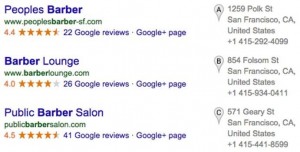 It’s no secret, after the past few years of non-stop Facebook changes, that Mark Zuckerberg no longer wants his social network to just be the place where people share baby photos and BuzzFeed videos with their family and friends. It’s probably also a good bet that Facebook’s strategy isn’t focused on just being a place where businesses create pages to promote their products and services through timeline updates, ads, and sponsored posts. Although making money from advertising is clearly important and, so far, Facebook seems to be doing a bang up job of it.
It’s no secret, after the past few years of non-stop Facebook changes, that Mark Zuckerberg no longer wants his social network to just be the place where people share baby photos and BuzzFeed videos with their family and friends. It’s probably also a good bet that Facebook’s strategy isn’t focused on just being a place where businesses create pages to promote their products and services through timeline updates, ads, and sponsored posts. Although making money from advertising is clearly important and, so far, Facebook seems to be doing a bang up job of it.
Pay to play is a business reality when it comes to Facebook. And now, the behemoth social network is even going further in the wooing of developers, brands, content creators, and marketers by launching a new platform focused on content, as well as through enhancing the Messenger experience.
The Facebook Messenger app was initially positioned as a place where users could converse privately with family and friends on Facebook. People were outraged when using the Messenger platform was required for all messaging within the social network and there was much angst about potential security concerns that have turned out to be mostly not worth the worry. But today, with more than 600 million Messenger users (that’s 400 million more than there were this time last year), more and more people have realized Messenger is not the boogeyman it was made out to be, and are happily placing calls, sending videos and recorded messages, and messaging away, all without having to launch their Facebook app.
Recently, Facebook Messenger decided to give PayPal a run for its money, and added the ability to send money, though this feature hasn’t yet rolled out universally.
What’s New About the Facebook Messenger Platform
During the recent F8 Conference Zuckerberg announced that Facebook’s new Messenger Platform will give those 600 million users the ability to share content using third party tools. But what really caught our attention is a soon-to-be launched feature called Messenger Business. If you are interested in being one of the first to try it out, you can sign up here to get your business on Messenger when it is released. The new service will offer businesses the ability to communicate on a deeper level with their customers, all in real time.
Messenger Content Apps For Stimulating Conversations
Facebook Messenger also gives users the ability to share different types of content to enhance conversations. Currently, Facebook has partnered with 44 companies to provide apps users can use to create and share content on the new platform. Let’s say your favorite baseball team is playing in an important game. You’ll now be able to easily share the score via the ESPN app. Animated Gif lovers will be able to use Giphy to create and share Gifs easily. I’m not going to lie – I popped in there the other day to check out the apps and could barely tear myself away. As if I need another Internet rabbit hole! Some of them are just fun, and many of them are pretty cool.
Now you want to go check it out, don’t you? When in the Messenger app, once you start the process of sending a message, if you look at the bottom row where you have the options of text, camera, photo, emoji, and recording, you’ll see three dots. Click on those dots and it will open the apps available to you right inside the Messenger app itself. Once you do that, you’ll see this:

I’ve only explored a little, but as with all of Messenger, it’s super easy to use. As the initial rollout continues, no more apps will be added. Good news for app developers and brands who have apps ready to launch or currently in development. As a user sends a friend a message using one of the new apps, the friend will not only receive it, but will be able to install and use the app themselves. This will be a great way to easily discover new apps and new brands. This is smart, as users and user adoption will actually help propel awareness and use of the apps.

Customer Support Via Facebook Messenger For Business
Now that we’ve covered what’s new with Messenger in general, we can talk about Facebook Messenger for Business. This also includes a multi-layered customer service component, likely in the hopes that this will entice more brands to sign up and check it out. Customers can use Messenger to reach out directly to customer support staff, and when customers buy from a retail website, they can also sign up to connect with that same company via Messenger. The image below from Everlane shows you what that looks like in action. I don’t know about you, but as much as I don’t want The Facebook having any more access to my life than it already does, this is just smart business. The more Facebook can weave its tentacles into our lives, both from a personal standpoint as well as from a business standpoint, the more data the social network has on us and the more it can ultimately profit as a result.

Retailers can use different templates with customers based on their specific needs and requirements, including order changes, confirming shipping dates and requesting technical support. In turn, customers will be able to speak directly with a brand representative and keep records of all conversations in one place. Word of warning here – if you’re planning on integrating this into your business operations, make sure you have well-trained people to be on the front lines of your social channels. Great customer service in social is wonderful. Problematic customer service tends to be magnified, so don’t put your people, or your brand at risk by putting just anyone on those front lines.

Some businesses already use live chat systems for their customer support, thanks to an integration with ZenDesk, they will also be able to run it through Messenger.
Brands will also be able to send push notifications to those who have opted in.
If you hate emailing “anonymous” customer service handles, Messenger for Business will feel like that first crocus spotting after an exceptionally long, hard winter. All your messages can be stored in one place, and you can see — in real time — if the customer support representative has received and read your messages. This makes me happy (as a consumer) and scares the heck out of me as a business owner, all at the same time.
Bottom line? Time will tell. It’s easy to see how the new Messenger platform can enrich conversation using content apps, we’ll see how it works in real life. I am very intrigued by this and am fascinated by whether Messenger Business for customer support will encourage more brands and customers to download and use the new Messenger platform.
And one thing is for sure? Facebook doesn’t ever sit still. With new integrations, new partnerships and new functionality rolling out on a regular basis, Facebook keeps marching toward world domination. And greater profitability. Which pretty much seem to go together. And Messenger? Let’s see how quickly that 600 million user base grows in the coming months. That’ll be interesting, too.
What do you think? Are you an existing Messenger user (and fan) like me? Do you see an application for Messenger for Business – specifically as a customer service communication channel? I’d love to hear your thoughts.
Photo Credit: proZesa via Compfight cc
(260)
Report Post





